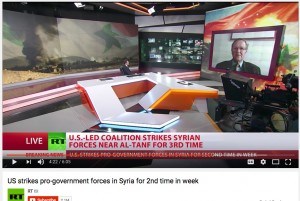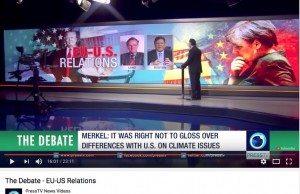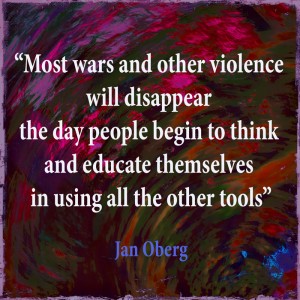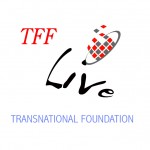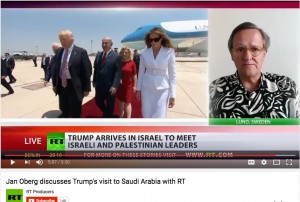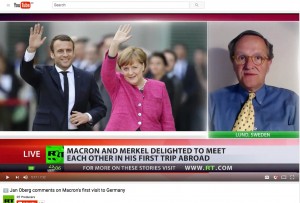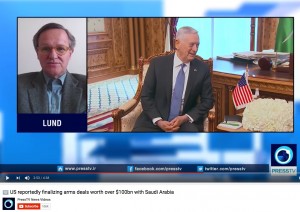Archive for the ‘Jan Oberg’ Category
What’s offensive and defensive in Syria
There should be a lower level to the statements by a US Secretary of Defence.
There should be a debunking of the unethical behaviour that repeatedly state that there is only a political solution to Syria and continue to use only violence.
There should be a discussion about international law here.
There should be a discussion of what is morally defensible in this case, even assuming for the sake of argument that President al-Assad is the worst guy on earth.
Why isn’t there – after so many years and so much human suffering and destruction.
We need a very different discourse about Syria – ASAP.
TFF PressInfo 417: The future of EU-US relations – The Debate
The Debate with Jim Walsh, MIT and Jan Oberg, TFF
Lund, Sweden – May 30, 2017
Last night “The Debate” on PressTV was devoted to the future of European-US relations in the wake of the NATO Summit, President Trump’s words and omissions and the – historic – words, in particular, of Chancellor Angela Merkel immediately after.
Undoubtedly, we are at a turning point in these relations in general and for the NATO alliance in particular.
To discuss these issues – past, present and future perspectives – were Jim Walsh, senior research associate at MIT’s Security Studies Program, Masschusetts, and Jan Oberg, director of TFF, Lund.
Thanks to PressTV’s excellently structured program and interviewer we touched upon a series of aspects and dimensions around which we found both agreements and slight disagreements – all in a sober tone fit for public education and personal reflection.
We hope this debate will stimulate your own thoughts about the future of war, security and peace.
We’d be grateful for your sharing it to media people, students and other academics as well as to decision-makers in the field that you may know.
TFF PressInfo # 416: Free thoughts on NATO at today’s Summit
By TFF Associates
Today there is a NATO Summit in Brussels and a new HQ is being inaugurated.
We at TFF believe that the existential issues about war and peace – and humanity’s survival – is worth discussing.
We believe in free research, freedom of speech as well as informes conversations helped, not hampered, by diverse and critical media.
Regrettably, we don’t see much of that when it comes to the coverage of NATO.
The alliance costs about US$ 900 billion a year but over its 68 years of its existence it has failed to create the stability, security and peace its mission – and mantra – is all about.
Its member states are in the centre of several long-term conflicts and nasty wars that destroy whole countries and civilisations.
Further, while the Soviet Union and the Warsaw Pact – NATO’s raison d’etre – has been dead and gone for more than 25 years, there is now a new Cold War in Europe.
It’s reasonable to discuss what is fundamentally wrong with this alliance.
We bring you below a selection of recent TFF analyses and comments that may be seen as an attempt to counterbalance the general mainstream coverage of the alliance and its members’ more or less constant warfare – in the name of bringing peace…
Jan Oberg – TFF Live today
Eight arguments
Johan Galtung
Missing: Political creativity
Jonathan Power
The hypocrisy of owning nuclear weapons
Jonathan Power
Making friends with Russia
Naskah Zada & Jan Oberg
Lost peace and fake news
Jan Oberg – TFF Live
US/NATO increasing tension with Russia: Focus Syria
Hans von Sponeck, Richard Falk and Denis Halliday
How the UN should respond in an age of global dissent
Farhang Jahanpour
America’s woes and Europe’s responsibility
Jan Oberg
Ten articles on the new Cold War and a reflection
Preceding dispatches also on NATO…
Jonathan Power in TFF PressInfo #415
On the leader of NATO’s leader
Trump is not a straight and true leader
Jan Oberg in TFF PressInfo # 414 Part 1 & 2
On Gulf NATO
Trump in Riyadh – A Gulf NATO to gang up against Iran and Syria
If you like this..
Go !
May we recommend that you also visit and follow
TFF’s online “flipping” magazine
“Transnational Affairs”
A very handy, up-to-date public education service selecting the finest articles from all over the world.
And made for both your screen, tablet and phone.
•
TFF provides totally independent research and public education related to the basic UN Charter norm that “peace shall be established by peaceful means”.
We are always happy to hear from you or try to answer your questions.
This text may be reprinted as it is with due credit and links to TFF but we shall appreciate you telling us. If shortened, please send the abridged version to obtain our permission.
Jan Oberg, TFF director, dr. hc.
NATO is outdated and should be dissolved – 8 arguments
This is TFF Live on Facebook on the occasion of NATO’s Summit in Brussels on May 25, 2017.
We use TFF Live on Facebook because it is handy, personal and interactive and because such live broadcasts have a larger organic spread that texts, images, links and even YouTube videos. And we want to make use of the technological developments as they help TFF reach out to ever more.
I feel very strongly about the harmful modes of operation of this US$ 900 billion giant element of the global Military-Industrial-Media-Academic Complex (MIMAC) and shall therefore be most grateful if you would spread it. This is the url of it. Thanks!
Trump’s historically catastrophic speech in Riyadh
TFF Live
An intro to TFF PressInfo # 414 A & B
TFF PressInfo # 414 (B): Trump in Riyadh – A Gulf NATO to gang up against Iran and Syria
By Jan Oberg
The role – again – of marketing companies in selling wars
Few wars have been so thoroughly media-managed and marketing-loaded as that on Syria. No wonder arms deals are too – otherwise citizens around the world would protest loudly that their tax money is spent on destruction and more destruction and all the promises of the past that this – or that – arms deal will increase security and peace in the world have turned out to be fake information – disinformation – and an integral part of what can only be termed “fearology” by governments against their own people.
One must therefore welcome Russia Today’s excellent research by Alexey Yaroshevsky also on this dimension.
This report is high-speed but listen carefully to it as it points out two US companies associated with this deal and US-Saudi relations with questionable image – a report that also highlight to some extent the roles of both Bill and Hillary Clinton in all this: the Qorvis MSLGroup and Burson-Marsteller.
In passing one cannot but deplore that it is Russia Today, not its Western peers, that does the research on the role of PR and marketing firms.
NATO in Gulf with Denmark as a liaison?
Back to NATO in Kuwait and what it may mean.
Here is what the United Arab Emirates’ daily The National reported on January 24, 2017. Interestingly, Kuwait, Qatar, Bahrain and the UAE are members of ICI – the Istanbul Cooperation Initiative – while Saudi Arabia and Oman plan to join. This is exactly the coalition we have mentioned above.
Three days later the same sources quotes the Danish ambassador in the UAE: “Nato officials are expected to visit in coming months after the Danish embassy in Abu Dhabi becomes the country’s go-between with the bloc, said Merete Juhl, the Danish ambassador. Read the rest of this entry »
TFF PressInfo # 414 (A): Trump in Riyadh – A Gulf NATO to gang up against Iran and Syria
By Jan Oberg
Today, I am proud to say that NATO has a new home in the Gulf region. And that we have opened a new chapter in our deepening partnership.
NATO S-G, Jens Stoltenberg, in Kuwait on January 24, 2017
The Secretary-General also said this new home’s “potential is enormous”.
President Trump arrived on his first trip abroad to Saudi Arabia on May 19, 2017 and big things are supposed to happen, including Saudi Arabia presenting itself as a innovative, visionary leader of the region.
His visit must be seen in the light of a number of events and trends, and in what follows we do like the military when it scans the horizon for enemies: we look for patterns – not the least Saudi Arabia’s “surprising new military goals” as Forbes’ Ellen Wald appropriately calls them.
Or, as they say – we connect some dots that, invariable, Western mainstream media have no capacity and probably also no interest in connecting.
This pattern consists of at least these events and long-term trends:
1. The broadening of NATO cooperation with Gulf countries – one may even see a Middle Eastern NATO branch emerge.
2. Saudi Arabia’s evident leadership in building a new multi-national army announced a couple of years ago and allegedly having 100.000 troops as a goal. This is an extension of the Gulf Cooperation Council’s and its old to-be-replaced military arm, the Peninsula Shield Force
3. The intensified image in the US under Trump of Iran as a threat and a ‘ganging up’ against it.
4. The war on Syria’s territory with hundreds of foreign conflict participants including NATO country Turkey and allies such as Saudi Arabia, the Gulf States and NATO members such as England and France – all in support of anti-government/regime change and pro-terrorists.
5. The second Cold War – very different from the first – between NATO and Russia which also has a Middle East dimension in that Russia is a vital partner of the Syrian government and the Syrian Arab Army.
6. The conflict formation that has Israeli as it’s centre – Hezbollah, Iran, Syria (the Golan Heights), etc. If you want to know what Israel wants to use Trump’s visit for it’s clear from this analysis: More confrontation with Iran and cooperation with Saudi Arabia, also concerning Syria.
7. NATO’s obvious crisis – the new Cold War around Ukraine; its second largest military member, Turkey, working closely with arch enemy Russia, ongoing trans-Atlantic conflicts about burden sharing etc.
This will suffice as an illustration of the complex web of inter-connected issues. There are surely more and we can’t go through them all in this short article.
By way of introduction it should be mentioned that NATO has, as alliance, been engaged in the Middle East for a long time – through the Mediterranean Dialogue begun in 1994 and “elevated” to the Istanbul Cooperation Initiative ten years later in 2004.
What’s going on now is, however, on a quite different scale.
The US-Saudi Arabia arms deal
The US and Saudi Arabia are to sign a huge – yet another – arms deal, valued at US$ 110 billion and, over a ten-year period perhaps mounting to as much as US$ 300 billion. It’s been facilitated by Trump’s son-in-law, Jared Kushner in a rather unconventional way.
Given that Saudi Arabia is the world 3rd largest military spender – i.e. directly after the US and China and, thus, bigger than Russia – this project must be seen in the realm of irrational militarism outside any domain of policies for peace in the Middle East.
And it’s important to keep proportions and priorities clear in these affairs. OECD’s Development Assistance Committee (DAC) spent more than $135bn (£90bn) in 2015 – i.e. the world’s richest countries give about half of the value of this single arms deal to help poor countries manage and eradicate poverty.
It is a clear example of the vested interests of the Military-Industrial-Media-Academic Complex (MIMAC) that threatens the very survival of humanity and is way beyond democratic control. Western mainstream media’s very subdued coverage of this – extreme – dimension of US foreign policy in general makes them complicit and justifies their inclusion in the MIMAC concept.
It goes without saying that this deal is marketed to the world as promoting stability, security and peace and as an important element in the global War On Terror. Given all the other weapons that have been pumped into the Middle East region the last 4-5 decades and all the countries that have been more or less turned into ruins – it’s quite obvious why, as usual, there is no intellectual connection between this deal and the said goals.
For NATO and the mantras, media and marketing is everything.
Russia Today has done a rather decent piece of research on this (see below). Among other things, it makes clear that the deal includes weapons that have little, if anything, to do with fighting terrorism. One of them is the Terminal High Altitude Area Defense (THAAD) missile defense system from Lockheed Martin that the US is also stuffing down the throat of South Korea.
To be able to win war, not to prevent them.
If for a moment one applies some kind of security political logics to this deal, it’s obvious that this build-up is directed – in the longer term perspective and with Israeli support, one must assume – against Iran and Syria. Israel’s official view is expressed here – official because otherwise this minister would have been fired for such statements.
The military expenditure “correlation of forces”
Military expenditures is not the only measure of military might. Neither is it an indicator of who would win a war; contemporary history is full of examples of big spenders losing wars when attacking countries with smaller military budgets.
That said, if you do a search on “world military expenditures” you’ll get a sense of who is willing and able to invest in the military and, also, a rough measure of both proportional allocation to the military sector and, above a certain level, an index of on dimension of militarism.
There are indexes by SIPRI and by the IISS and others – and here are the rough ‘correlation of forces’ pertaining to the countries we talk about here:
• Saudi Arabia is the 3rd or 4th largest military spender on earth after the US, China and perhaps Russia.
• Saudi Arabia spends about between US$ 64 and 82 billion annually (depending on source you consult), growing 20% per year and that is the extremely high 10 % of its GDP. Read the rest of this entry »
Macron meets Merkel – Why all the hype?
Comment by Jan Oberg
Contrary to many media reports, I take a more cautious approach – until we see some concrete results in the wake of this meeting.
In addition, the two meet at a very problematic time for the EU – and it seems that there were a series of foreign policy issues that they did not even touch.
For the EU to re-invent itself, something much grander, more visionary than President Macron’s economic piecemeal approach will be needed.
So until further I choose to paraphrase Shakespeare’s Hamlet – “Words. Words. Words.”
Comments made on RT – Russia Today
Saudi Arabia’s ongoing militarization – we need everything but that in the Middle East
By Jan Oberg
New US arms export deal with Saudi Arabia, worth US$ 100-300 billion – and Saudi Arabia is already the 3rd or 4th largest military spender on Earth. Alone it is 5 times larger than Iran and the Gulf Cooperation Coouncil 10 times bigger.
Is this for a future smashing up of Iran and Syria? With Western aid? And what does NATO do in Kuwait and the United Arab Emirates, the latter coordinated by Denmark’s ambassador there, Ms. Merete Juhl?
And Arab wing of NATO?
